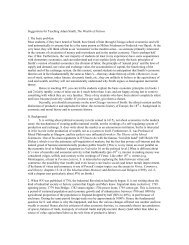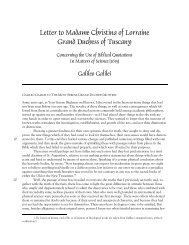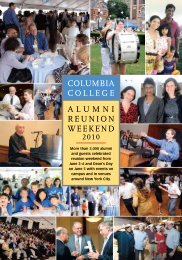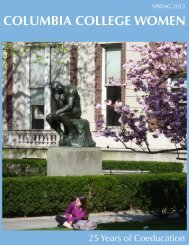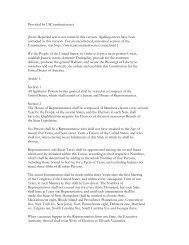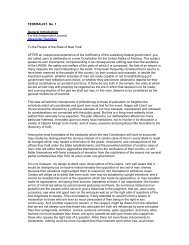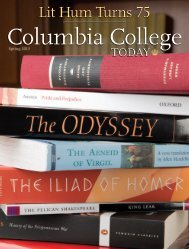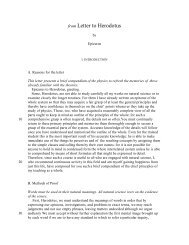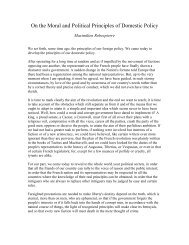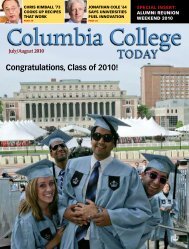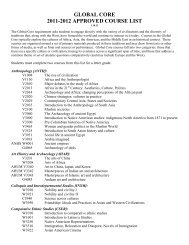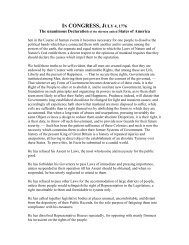Student Life - Columbia College - Columbia University
Student Life - Columbia College - Columbia University
Student Life - Columbia College - Columbia University
Create successful ePaper yourself
Turn your PDF publications into a flip-book with our unique Google optimized e-Paper software.
<strong>Columbia</strong> CollEgE Today STUDENT LIFE<br />
“Dean orenduff was an adviser and friend, in the truest senses of the words.”<br />
in the NSOP Schedule Book students receive upon arrival.<br />
<strong>Student</strong> organizations provide a niche for students looking<br />
to engage in politics, explore ethnic or racial issues, or perform<br />
community service in the greater New York City community.<br />
<strong>Student</strong>s of color, for example, participate in a leadership retreat.<br />
In another program, called Under One Roof, students learn the<br />
skills required of living in a diverse community.<br />
“Because <strong>Columbia</strong>’s campus community is so diverse, part of<br />
our role is to help students develop tools so they can thrive in a<br />
culture that celebrates differences,” says Martinez. “We want students<br />
to recognize where biases may exist and to support them in<br />
the difficult conversations that often result.”<br />
<strong>Student</strong>s are encouraged to not only participate in planned<br />
community-building activities but also explore interests that may<br />
initially appear outside of their comfort zone.<br />
Carmen McClure ’12, a psychology major, discovered her passions<br />
through the Double Discovery<br />
Center, which serves<br />
more than 1,000 high-need,<br />
college-bound New York City<br />
teens in programs that improve<br />
their academic and personal<br />
skills. The DDC, which<br />
was founded in the 1960s, is<br />
not under the oversight of <strong>Student</strong><br />
Affairs.<br />
Last spring, McClure took<br />
DDC students to <strong>Columbia</strong><br />
classes to give them a taste of<br />
college pedagogy. This fall,<br />
she’ll train <strong>Columbia</strong> students<br />
to work as DDC tutors<br />
and will meet monthly with<br />
the student volunteers to support<br />
their work.<br />
Dean Michele Moody-Adams speaks with former student leaders Sue Yang ’10<br />
and Isabel Broer ’10 at a campus event last spring.<br />
Better communication and collaboration between administrators<br />
and students is a key underlying element in the<br />
improvement in student engagement.<br />
When Moody-Adams arrived at <strong>Columbia</strong> in summer<br />
2009, she was interested in establishing informal, unscripted<br />
monthly meetings with small groups of students. At about the<br />
same time, Weiss had proposed a similar concept to the <strong>Student</strong><br />
Council. “The dean wanted to meet with students, and <strong>Student</strong><br />
Affairs latched onto the idea and ran with it,” recalls Weiss.<br />
The concept drew a huge response. Fifteen students were chosen<br />
at random from among 600 who expressed interest in sharing<br />
tea and conversation with the dean. The teas became a monthly<br />
event last academic year, with different groups of students attending<br />
each time. The dean plans to continue these informal<br />
gatherings with students in the future.<br />
“The teas are not really about airing any grievances or concerns<br />
that students may have, though they certainly allow students<br />
to do that when they feel so inclined,” says Moody-Adams.<br />
“More important is that the teas provide a low-key environment<br />
in which students can talk about their experiences at the <strong>College</strong>,<br />
about how they see the world and what they care about, and<br />
about what things are working well at <strong>Columbia</strong> as well as what<br />
SEpTEMBER/OCTOBER 2010<br />
19<br />
things might need to be examined and possibly changed.”<br />
During the academic year, the Community Development staff<br />
works collaboratively with students on campus issues and supports<br />
several hundred student organizations. Policies on cuttingedge<br />
campus issues, such as hosting controversial speakers,<br />
drinking at parties and gender-neutral housing, also are developed<br />
collaboratively among students and administrators. “There<br />
was a time when these issues could have created an adversarial<br />
relationship between students and the administration,” says<br />
Shollenberger, who says his focus in each instance is on developing<br />
the best policy for <strong>Columbia</strong>. “It used to be a very ‘we-they’<br />
thing on many issues. We are working together now.”<br />
For example, <strong>Student</strong> Affairs worked closely with the Inter-<br />
Greek Council on a policy, adopted in 2009, for social events in<br />
fraternity and sorority houses. <strong>Student</strong>s wanted to defuse the tensions<br />
that arose over crackdowns on drinking by campus security.<br />
David Salant ’10, an officer of<br />
Delta Sigma Phi, said the old<br />
policy didn’t work because<br />
fraternities were forced to hire<br />
costly security details and register<br />
parties weeks in advance.<br />
Rather than adhere to those<br />
policies, some fraternity parties<br />
went underground, which<br />
Salant says encouraged unsafe<br />
behavior.<br />
The new policy allows fraternities<br />
to register parties five<br />
days in advance. The fraternities<br />
or sororities name three<br />
event monitors for each party<br />
to check IDs at the door and<br />
distribute wristbands to those<br />
21 and older, who are allowed<br />
to drink. A maximum of 75<br />
guests are allowed per party. Alcohol can be served to those 21 and<br />
older at a rate of one drink per hour, and parties must end at 2 a.m.<br />
“We got more freedom in exchange for subjecting ourselves to<br />
higher standards,” says Salant, who now is an equity derivatives<br />
analyst at JP Morgan. “We wanted to show them we could run<br />
parties that were safe, and that we could be held accountable. It<br />
took a lot of faith on their part to trust a bunch of frat boys. We’re<br />
glad they did.”<br />
For Shollenberger, resolved issues like this one have been central<br />
in a career in student affairs that included stints at the <strong>University</strong><br />
of Hawaii at Manoa and American <strong>University</strong> in Washington, D.C.<br />
Developing good relations with students is a key to his success.<br />
“We try to be very visible,” says Shollenberger. “We can’t just<br />
sit in our offices and expect students to come to us.”<br />
Moody-Adams says Shollenberger’s encouragement of student<br />
engagement has paid dividends.<br />
“He respects students and values their active leadership but<br />
also understands the importance of creating an environment in<br />
which they can remain safe in the exercise of their leadership,”<br />
she says. “He welcomes diversity of all kinds, and works hard<br />
to ensure that students give one another space in which to act on<br />
their diverse values and opinions, without harming others.”



